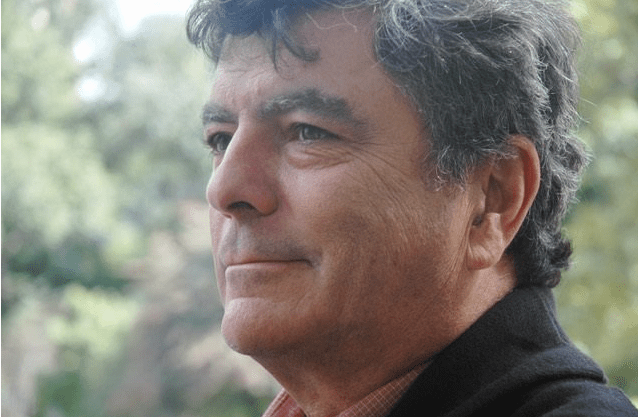Steven Perez
Virginia, United States
 |
| A photo of Steven J. Perez, MD, 2010, New York City. Photographer: Margie Eyman Perez. Published with permission. |
It was the late 1980s. I had just been discharged from the Air Force and returned to my hometown of San Antonio, Texas, to look for an internal medicine practice to join.
As I waited for responses to my inquiry letters, I found a job in a rural Texas emergency room where I could use my training in battlefield medicine. One night a woman walked in carrying an unresponsive five-year-old girl. I asked her in Spanish what was wrong. She told me that her child had been feverish for four days. She had treated her with water and herbs and until that evening, she had still been eating. But tonight when she came home from work, her daughter was not responding. She was a beautiful child, with flowing black hair, a dry mouth, and a fever of 105 degrees. I could not arouse her. This border town of 20,000 people had only three doctors: I decided to air evacuate her to San Antonio.
At the time, the only air ambulance was from Brooks Army Hospital. I was told that the team could be there in an hour and a half. I went back into the room, separated by curtains from the other four, and asked the mother what had happened. Her husband worked two shifts at McDonald’s, and she was a part-time maid at the local motel. She knew that her baby was sick, but they had no place to take her. Why not to your doctor? We have no doctor. Has she had her shots? She never got shots. Her teeth were rotting. Did she ever see a dentist? No.
I called the University of Texas at San Antonio to talk to someone about what to do for the child while we waited. A pediatric resident walked me through IV rates and medication dosages. I watched the child while the nurse stroked her hair, cooing encouragement. The phone rang: they would be there in five minutes. I ran to the parking lot where the sheriff had cleared a spot for the helicopter. The roar of the rotors shook me with a sense that we could save this child. A young blond nurse and a sergeant with experience as a battle corpsman emerged. She took the history and he began the evacuation. The nurse told me that only the child could fly. She bent and kissed the child, then hugged the mother. The sergeant bound the child in a harness and the helicopter left. I stood as the thick air washed over me. On the eighteenth hour of my twenty-four-hour shift, I drank a Mr. Coffee, which had been sitting for fifteen hours.
The child died. I wept. I wept because our society has no place for underemployed people who cannot find doctors, for immigrants who fear our health care system, for rural America, and for a country that no longer cares for the most unfortunate.
I was proud of the Army: the difficult landing in a dark parking lot, the dedication of the corpsman, and the gentle hand of the Army nurse.
We doctors are the most fortunate humans on earth because we are allowed into the most sacred moments of other people’s lives. We are humble in the knowledge that we only touch our patients briefly in their long journey, but we always carry their trust.
Note From John Lynn:
I submitted “A Day in Texas” by Steven J Perez, MD, for publication. Dr. Perez tells the story of a mother and child for whom he cared during a twenty-four-hour shift in an ED in a Texas border town. While still practicing and teaching in his office in northern Virginia, Dr. Perez contracted Covid-19. After Dr. Perez’s death from Covid-19 at age sixty-eight, I began a search to retrieve the essay which his family found in the files of his ninety-nine-year-old father’s computer. In this time of heightened concern about immigration on the southern border and the care of children of immigrants, I believe Dr. Perez’s essay should be read by a wider audience.
Dr. Perez and I were friends from our first day of medical school and were residents in internal medicine together. He sent me an email from an emergency department in northern Virginia telling me that he had Covid-19, that he had an oxygen saturation of 50%, and that he “felt really scared.” He died in May 2020, after being on life support in the ICU for about two weeks.
Everyone loved Steve: his family, patients, medical students, and two US presidents.
– John Lynn MD
In memoriam: Steven J Perez MD (1951-2020), Clinical Professor of Medicine, University of Virginia School of Medicine.
STEVEN J. PEREZ’s grandparents immigrated to Texas from Mexico. His father was a navigator of bomber planes in WWII. As an Air Force Major, Dr. Perez was a physician for presidents Ronald Reagan and George H.W. Bush, then practiced medicine in Texas. He and his family moved to northern Virginia where he became Clinical Professor of Medicine at University of Virginia, teaching medical students in his office twelve months a year for twenty years. He cared for patients until shortly before his death from Covid-19 in May 2020. His elderly father saved this essay in his computer file.
JOHN T. LYNN, MD, medical school classmate, internal medicine residency colleague, and friend of Steven Perez submitted this essay on behalf of Dr. Perez.

Leave a Reply